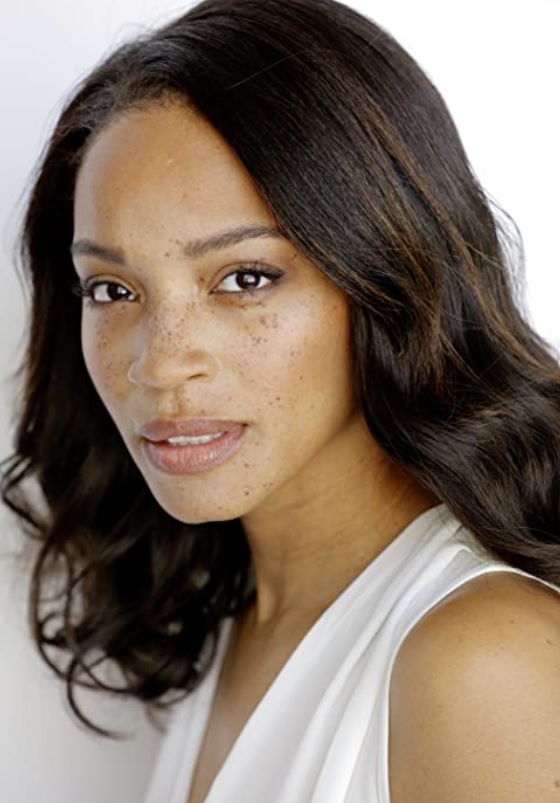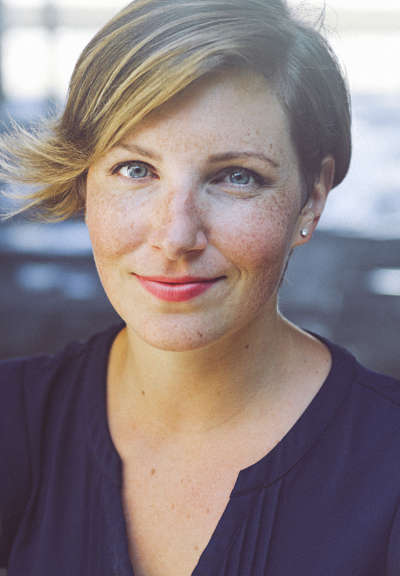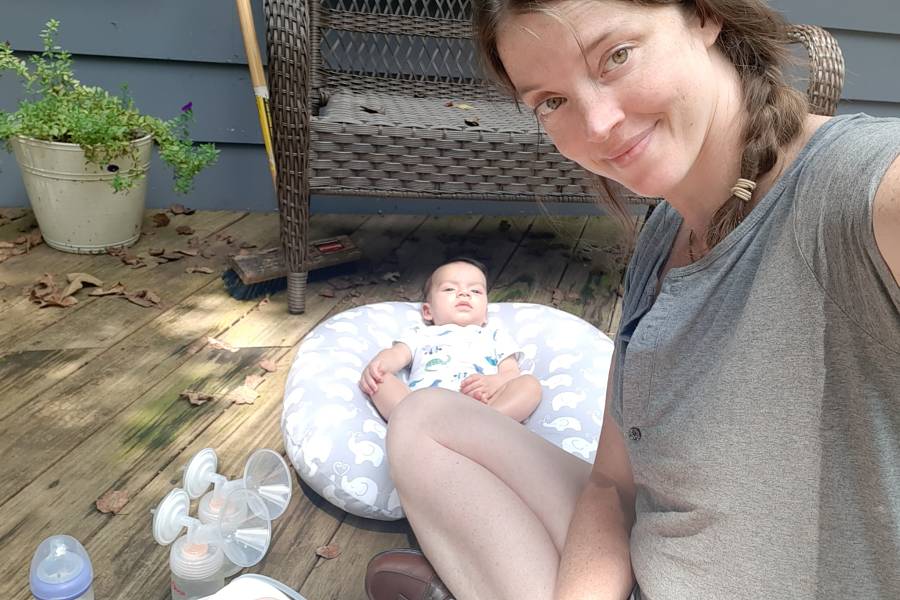As I stare at the pieces of rubber and debris rolling off the back right tire of the Ford pickup in front of me, puttering our lane to a full stop, my breath quickens, my mind races, anxiety and guilt flood in. I usually feel several degrees of stress on the Atlanta 75/85 Connector commuting from campus to home. As anyone who has even visited Atlanta can attest, traffic is a nightmare wrapped up in misfortune. But today the stuck traffic is stickier.
I’m picking up my 4-month-old, Ram, from day care. It is his first week. Every part of me rushes except the car I’m stopped in. I feel the stress levels in my chest, gut, shoulders, forehead—oh, and all of this as I’m PWD-ing (pumping while driving). I wonder how many other mothers take this questionable yet sometimes necessary step? I wonder if every mother thinks the thought my brain is now screaming: I’m a bad mom!
I think about how at this time last year, I was throwing up in a Kroger bag, wondering if I should tell the director of the Zoom workshop I was in that I was pregnant, still feeling I could easily hide it. On Zoom no one could tell anyway!
I think how I probably wouldn’t be back at work right now if I had paid maternity leave.
An I-75 pity party will literally get me nowhere, and what have I got to be upset about? So many new moms in our country, and in our industry, have it much harder. I reflect on how I’m blessed to be in a tenure-track theatre faculty position where I love my students, colleagues, and what I do. I have a healthy little baby fascinated by the world. I had the summer months to be with Ram and breastfeed/pump, in a country where breastfeeding is still a privilege, given the short or non-existent maternity leave we get to establish it.
Acting has been most of my theatre background. I think it’s because I constantly hunger for direction. Somebody please tell me how to do this!
I think of the note about parenting I hear more than any other: “It takes a village.” And, like the actor on the defensive at a director’s note, I retort, What if all the villages disappeared or are virtually impossible to find during a global pandemic?
It’s an isolating business, this motherhood, magnified intensely by pandemic. I felt the neeed to reach out to other theatre artists who are mothers for insight.
So I did.
I spoke to three women who, to my outside eye, are graceful experts. Shinelle Azoroh is an actor, director, creator, and producer based in Los Angeles; mother to Zadie, she will have birthed her second child by the time this article publishes. Lori Wolter Hudson is a director and producer, and is the current artistic director of the New Harmony Project; she is mother to Isabel and Bridget. And Paméla Rodriguez-Montero is a scenographer, visual artist, and assistant professor of design at the University of California, Santa Cruz; she is mother to Ker.

My vision of these women’s miraculous balance was quickly exposed as an illusion. “Instagram—you think you know what’s going on in people’s lives,” Shinelle told me. “But it’s different when you actually get to talk to them.”
Each of these women shares in the impossibility of being a mother while doing anything else, let alone the performing arts. As Paméla put it, “It’s irrational, being a mom in this field.”
That irrationality has only been heightened over the past year and a half.
“Pandemic highlights all the challenges that are already there,” Lori said. “Trying to be and do everything for this job that I always wanted and the real needs and demands of being a new mom with a second kid. Capacity and space—a kid takes up so much room in your…self.”
When I was getting support for postpartum anxiety, the social worker broke down three circles of perinatal basic needs: self-care, clinical support, and social connection. The pandemic only magnified the challenges of meeting these basic needs. With quarantining and social distancing, isolation is multiplied and the “village” must be primarily virtual.
And not just for parents. Shinelle said, of her daughter Zadie’s experience with lockdown, “There was a point we saw in her that she needed other little people. We missed the playdates; we saw we needed another human for her. That’s when we started having discussions about giving her a sibling.”
It’s complicated to be in a “village” now. Many of our theatres and communal spaces have opened, lifting mask mandates and social-distancing requirements. At my teaching job all I can do is beg my students to wear masks on behalf of my infant’s immune system, but I cannot require this.
“There are many structures in which we can’t find what we need, because they were never meant for us in the first place,” said Paméla. “Being an immigrant, I find myself in places where I don’t really fit. It’s the same with being a mom. There are places that are not meant for us. We have to say, ‘Hey, changes need to happen for me to thrive in this community, in this profession.’ For example, breastfeeding alone is a full-time job.”

For about two months I have been exclusively pumping my breast milk (and I’ve only just realized that other mothers do this), a choice based on several factors, including food allergies. I’m not anti-formula; we supplemented early on when postpartum anxiety impacted my milk supply. I’ve worked hard to build it up to have a stash in the freezer, but on the first days of day care, I was speeding from campus to feed Ram milk I just pumped. I wish I could include that as a special skill on my résumé.
For those who must return to work a few weeks postpartum, breastfeeding in this country is virtually impossible. This is especially true among marginalized groups, and our field is no exception, with even the better paid, purportedly secure jobs still overwhelmingly occupied by white people.
Paméla used a great phrase: “the fragmentation of motherhood.” This resonates for us in the theatre maybe more than in other professions. Many of us come to theatre in the first place because we love it, and, as Lori said, “We often think of a play as ‘our baby.’” I love what I do—I love engaging craft with students, enthralled by their discoveries in process. And I love being with Ram, enthralled by his discoveries in process of becoming more alive.
Recalled Shinelle, “When Zadie was 6 or 7 months, I was playing Black Mary in Gem of the Ocean at South Coast Rep. There was a gap in trying to find out who I am now—I kept looking at this baby, and it kept coming to me that I want her to be proud of me. And I guess I want to be happy. So that meant I had to keep working.”

Aspects of the pandemic make it more possible to be in two places at once. But every time I hop on a Zoom meeting or rehearsal with Ram at my side, I feel self-conscious, even ashamed. Everyone might coo at his cuteness, but I worry that they are thinking, “Don’t bring a baby to work!” If we were in person, Ram likely wouldn’t be there, so why should Zoom be different?
Except it is. As Paméla put it, “If it’s after 5 p.m., I’m bringing Ker with me.” Some of us aren’t even pursuing any in-person work right now. On top of health concerns, it’s difficult to imagine tech rehearsals until 10 or 11 p.m. when childcare is less available and my child needs me profoundly. Indeed, I am at least partly writing this from the haze of sleep deprivation, amid Ram’s tummy time and naps, to fulfill “creative activity” in my academic workload. So I’m able to dodge some of the realities of working in the theatre with a child.
Our conversations addressed these realities, and we emerged with this list of needs for mothers in the theatre:
- Paid maternity/parental leave or the equivalent subsidizing freelancers
- Updated rehearsal schedules. The growing movement to end 10-out-of-12s is great, but why not also keep most of tech in the daytime when childcare is more available?
- Childcare provided in theatres/workplaces
- Spaces and time in theatres/workplaces to breastfeed, pump, and feed
- The inclusion of pregnant bodies on our stages
- Provisions for mental health support
- Grace from our colleagues
Efforts are being made. Organizations like the Parent Artists Advocacy League (PAAL, whose efforts were covered extensively in the April 2020 issue of American Theatre) provide resources and support for parent artists. Many spaces, like the New Harmony Project, offer nannies to resident playwrights with children.
Paméla suggests working with other mothers. In fact, one thing that sprung out of our interview was a collaboration: her as scenographer, me as performer/director on a new project. Hypothesis: Working with other mothers meets more of our access needs.
Honestly, I judge myself for having Ram at the Zoom meeting because my attention is split. That’s a new reality: Whether I’m physically with my child or not, my attention will forever be split. All my acting training to be present, in the moment suddenly feels unattainable. I’m uncomfortable with that.
The popular psychotherapist Esther Perel has said, “The opposite of polarization is paradox.” I wonder: Can I work with the fragments…accept them…use them…the way a really strong actor does?
I begin to see some coherence in these mothers’ evolutions. I hear in them heartbeats of inclusion echoing in the civic reckonings the pandemic has uprooted.
Paméla talked about a deeper appreciation for the body in her work as a costume designer.
“Especially after living in a body that changed so much, that created life—you don’t really recognize your body,” she said. “Coming from that sensibility to understand that you are going to work in the space of other people’s bodies, that matters so much. It has made me a more conscious designer. Someone who maybe doesn’t get it right all the time, but tries to make a welcoming, inviting, sacred space for the performers to interact and be themselves. The relationship with bodies and how we work with that space has changed for the better from pregnancy—seeing the shifting, the vulnerability, the pain, has given me a deeper understanding.”
Lori advocated including pregnant bodies onstage.
“I’m not sure if it started before or after I got pregnant, but I am obsessed with the idea of casting visibly pregnant women in stage roles,” she said. “I mean, how amazing would it be to have a pregnant Lady M? I saw a pregnant woman in an outdoor staged reading over the summer—it didn’t necessarily make sense for the character, but, similar to a line about a character having blonde hair when the actor is a brunette, you note it and then just forget about it and move on.”
For her part, Shinelle is thinking about how to channel new insights into her work. “Creatively, I’m intrigued with being an advocate for children of color and brown women—having conversations with other mothers when kids feel like ‘the other,'” she said. “Kids go through a lot. They have heavy emotions even if they can’t use the words. I want my work to advocate compassion and teach empathy.”
Talking with these women, I feel like I’ve slept through the night; I am energized by their work-life emergence. Amid the impossible and paradoxical, they bravely champion the union of motherhood and art during pandemic. Suddenly I realize: In writing this and reaching out to these mothers, this is me making my village.
Maybe next time I’m stuck on the I-75/85 Connector, the poetry of where I am won’t be lost on me. Maybe I’ll think about the mom-group text thread Lori cherishes, or Paméla and her students. Or I’ll remember Shinelle’s invitation to change: “We shed something old and become something new. It’s a blessing.”
Breathlessly moving bumper-to-bumper through the heart of the city, I’ll know I’m connected to a village. And that it’s real.
Emily Kitchens (she/her) is a professional theatre artist based out of New York City and Atlanta. She is currently assistant professor of acting and artist-in-residence at Kennesaw State University in Georgia. She is mother to Ramrao (Ram).


